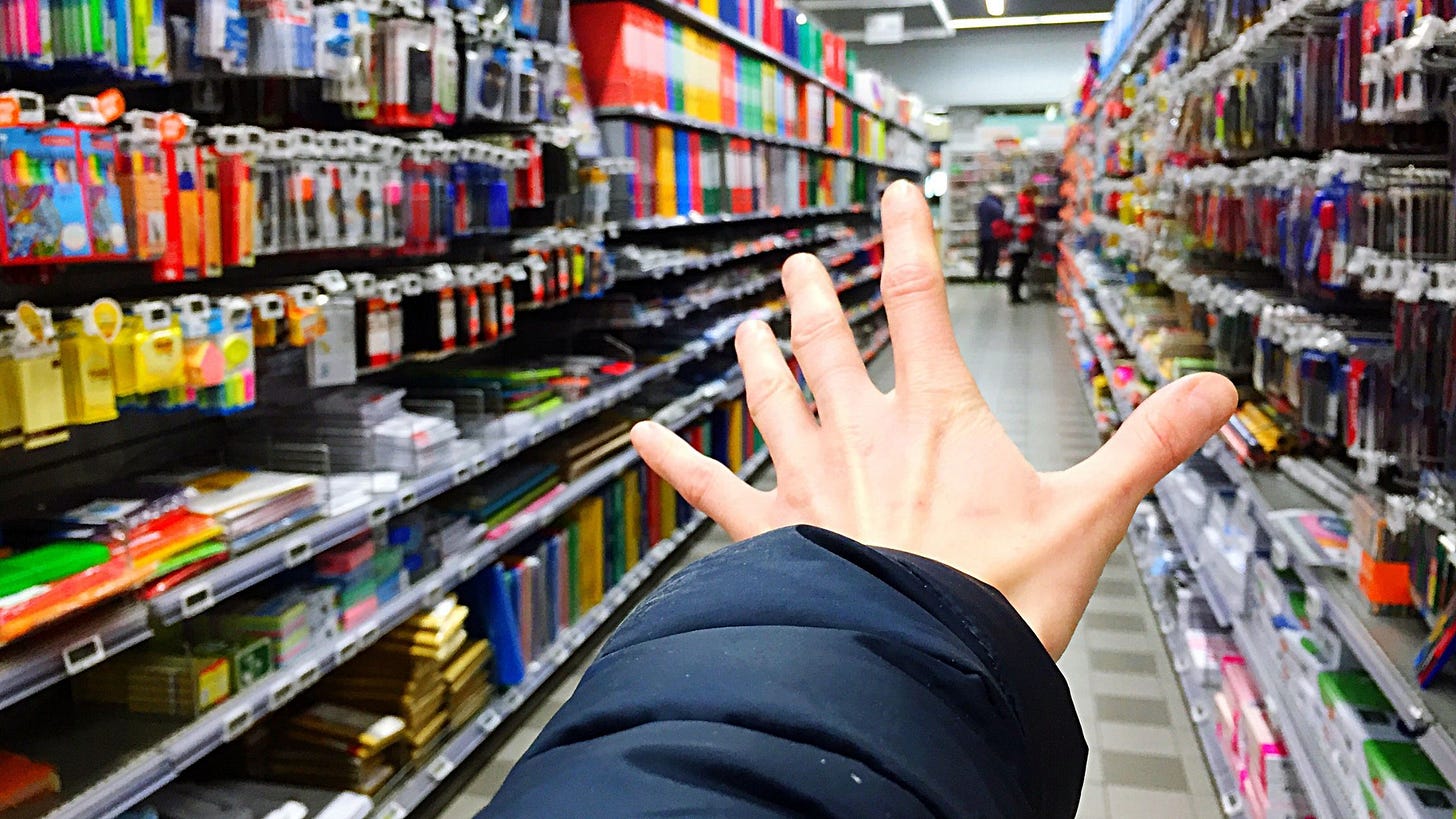This post was originally published on November 28, 2023 and I feel it fits the moment just as well as it did last year. So why not re-post it for those who didn’t see it and those who could use this reminder (including myself).
A couple days after the beautiful chaos of family gathering, endless kid energy, and just a whole lot of loud people in one place, I found myself in the post-holiday comedown. I was feeling especially emotional as I wandered the pharmacy aisles in search of cough medicine for my kid. While there, I found myself in the office supply aisle—which gives me some weird joy—and thought “maybe I’ll just get one little thing to make me feel better.” In that moment, I realized that this moment of letting my guard down by emotions immediately led me to fill that void with a purchase. It would’ve been a somewhat insignificant purchase—a notebook I most certainly didn’t need, perhaps—but the moment struck me as so very emblematic about living in a capitalist culture. Don’t worry about your sorrows, just buy something to make you feel better.

It’s in those post-holiday or post-family visit or post-big event comedown moments when I’m most vulnerable to these kind of void-filling purchases. These are the times when emotions that can’t be pegged to something specific, just that a bunch of pressure has been released and the weight of the world is there: the Portland teacher’s strike, the holiday sadness for families who lost loved ones this year, and of course, the Palestinian families whose homes and families have been destroyed by bomb after bomb. These are all worthy issues to be thinking about, but it feels so very American to think that one little purchase of a notebook I definitely don’t need might fill the space where the sadness of the world was being held.
It’s no accident that George W. Bush’s reassurance to Americans after 9/11 was to say the best thing you can do is to spend money. It represents how we’ve intertwined patriotism with consumerism. In the Vox story by Emily Stewart about 9/11 convincing Americans to consume more, she notes that it’s hardly the only example of consumerism-as-patriotism. The pandemic was a perfect example where so many of us (me included) poured the money we had into supporting small businesses to keep them afloat.
“There’s an earnestness to this,” Stewart wrote “in the face of crisis, people want to do their part, and if consuming is a way to do that, so be it. But there’s a cynical interpretation, too: To be a patriot is to wholeheartedly believe in American capitalism and the strength of the US economy, to pledge allegiance to the flag and the market. Consumer patriotism reduces civic participation to spending money.”
I think this patriotism of which Stewart writes is very rooted in an emotional reaction. I don’t know if many people I knew were buying takeout from their favorite local restaurants every week in the pandemic specifically because of patriotism. Rather, it was an emotional drive to hold onto something that we knew. And it feels culturally potent that there’s a kind of inherent drive to fill the void of uncertainty or fear or sadness with buying shit.
I’m not saying that we shouldn’t have supported all the local businesses we could during the pandemic. It really did feel like the only thing we had control of in an incredibly uncertain time. But the astonishingly thin margins on which many small to medium-sized businesses had also showed just how fragile capitalism really is. We’ve relied so heavily on capitalism-as-the-solution that we have built a system that could throw thousands of people into poverty with a few days or weeks of store closures. The pandemic showed that our safety net was not wide enough or strong enough to catch all the people who would need it.
“The numbers show half of the 64.3 million people who applied for what’s known as ‘regular’ unemployment assistance did not receive any money under [the unemployment assistance program],” wrote Shawn Donnan in Bloomberg. “It’s roughly akin to everyone in the labor force in California and Texas combined losing their jobs and not getting any help, with devastating economic consequences.”
This highlights shows that by focusing on capitalism as our solution to all ills, we’ve failed to build up a system that actually works for everyone. No amount of takeout and small business purchases was going to save our system.
This is not something new, of course. It’s something I wrote about last year and vowed this year to do a “No Buy Year” (which, if I’m being honest, was only marginally successful). As I enter the holiday season where we’re bombarded with deals while also having heightened emotions, I have to check in with myself about whether what I'm doing is an intentional act or if I’m merely trying to fill a void. And also when I am feeling strong emotions about something – say, climate change or genocide or whatever else is awful in this world – recognizing that my power goes much farther beyond what I spend and requires more deep action and change.
And above all, it’s about recognizing that those feelings are normal and don’t need to be filled with anything other than acknowledging that they exist. It’s a reminder that those emotions mean I’m a person with compassion and love for the world.




